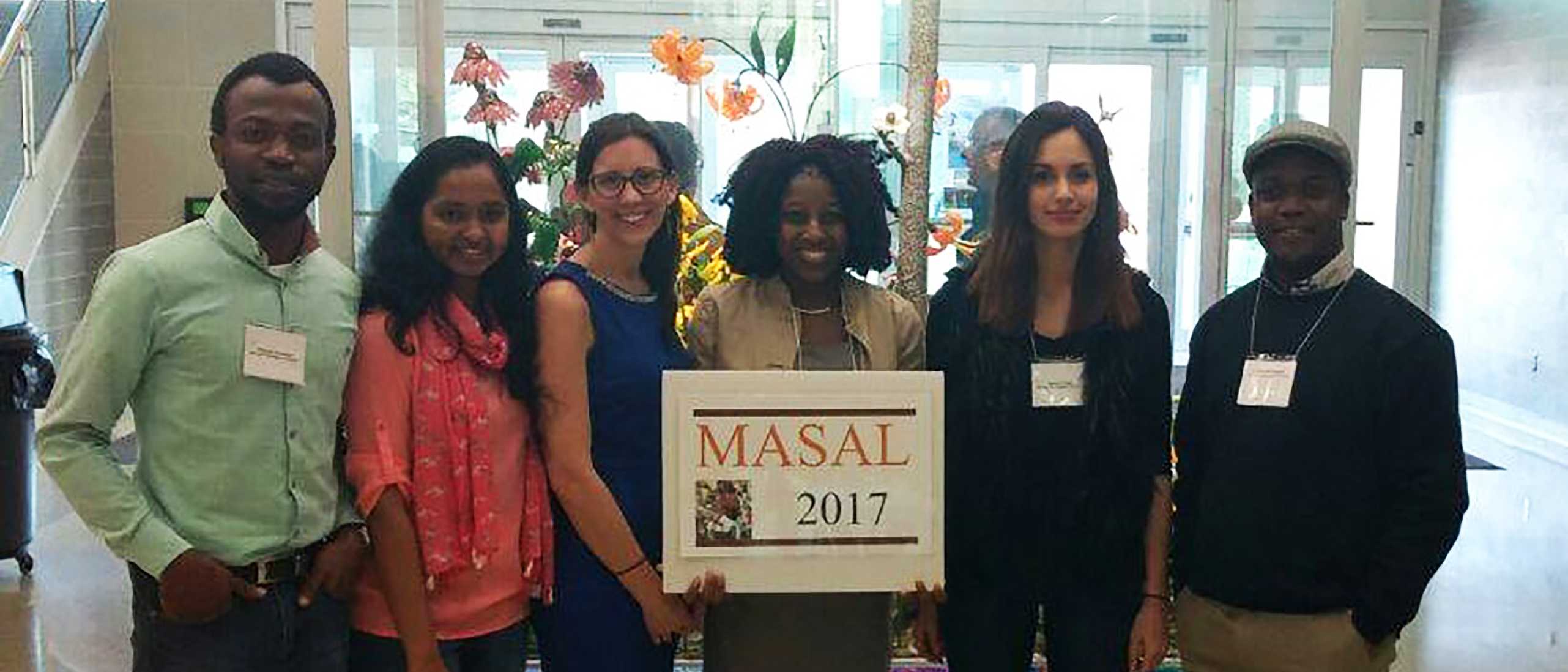Five presenters and a participant from the Department of Humanities participated in the 2017 annual conference of the Michigan Academy of Science, Arts and Letters. The conference was held on March. 10 at the Sangren Hall, Western Michigan University, Kalamazoo. All of the attendees from Tech were in the linguistics section, one of the over thirty parallel sections of the conference. The five presenters were Tolulope Odebunmi, a second year PhD student; Sara Porter, a first year PhD student; G. Edzordzi Agbozo, a first year PhD student; Marina Choy, a second year master student; and Olayemi Awotayo, a first year master student. The other participant was Geethu Madeckal Jose, a first year PhD student.
Odebunmi’s presentation delved into how the media portrayed Ellen Johnson- Sirleaf, the current president of Liberia during the 2005 election. Employing critical discourse analytical tools, she asserted that the media constructed “Johnson-Sirleaf as a person who embodies both female and male attributes, with the intention of creating a positive image of her.” According to her, this was necessary because Liberia had just come out of war. While some people hold the view that the country, at that time, should be nurtured with tenderness, others thought that the country was too volatile for women to lead.
Porter also used critical discourse analytical tools to establish an understanding of power, personal agency and accountability in the popular Stanford rape case, through the statements of the defendant and the plaintiff. According to her, the plaintiff, whose real identity was hidden since the case became a national spectacle, used language to paint a negative picture about the issue calling it “rape,” “torture,” and “forced.” The defendant, on the other hand, tried to dissociate from himself personal agency, calling what happened “an event.” Porter also said, “while the victim [plaintiff] uses adjectives of gloom the accused [defendant] uses those of neutrality and naivety.”
Choy investigated the ideological underpinnings of discourse related to sex education. The study, in particular, discussed how conservative discourse about sexuality was carefully crafted to push their ideological stance. Choy’s findings showed that conservatives portray pre-marital sex as hurtful and bad while sex during marriage was framed as good and pleasurable.
In his presentation, Awotayo attempted to show how praise and blame were enacted in political discourse. His work studied one of the independence day speeches of the current president of Nigeria, Mahamadu Buhari. Awotayo said Buhari’s “choice of words show a binary relationship where he attributes praise to his political party and blames the opposition party for wasting the resources of the nation when they were in power.” A unique thing he noticed about Buhari’s speech was that the president did not mention the name of the opposition party whenever he blamed them. This, he thought, is a style to hedge the severity of Buhari’s criticism.
The last person in the group to present was Agbozo. His research offered a multimodal perspective on the political manifesto of the National Democratic Congress, a political party in Ghana. According to him, “multimodality provides multivocality to the text where the verbal demonstrates a kind of facticity which is instantiated and concretized by the visual elements.” He also used the study to criticize Paul Chilton’s postulation on indexicality. While Chilton held that indexicality points to a specific time in political discourse, Agbozo proved that indexicality could also refer to a “timeframe without epistemic commitment” with the motivation to deflate accountability by politicians.
The Michigan Academy of Science, Arts and Letters was founded one hundred and twenty three years ago in spring 1894. Its members include independent researchers, professors and graduate students from the colleges and universities in the state of Michigan. The University of Michigan in Ann Arbor will host the March 2018 conference. The Department of Humanities’ rhetoric, theory and culture graduate program and the Graduate School Government supported the Michigan Tech participants with travel funds while Victoria L. Bergvall, an associate professor of linguistics assisted the presenters during their preparations for the conference.


